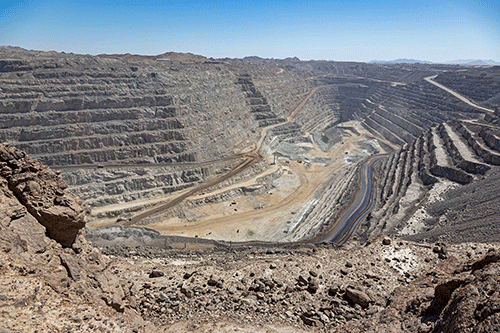The Rössing Uranium mine is currently offering voluntary separation packages to employees impacted by the appointment of a new mining contractor at the
mine. The voluntary packages are being offered until the end of 2026 when Chinese company Beifang Mining is scheduled to take over mining operations.
The year 2026 is when Rössing Uranium’s current mining operations come to an end, and the Chinese mining contractor will assume operations in extracting uranium from the longest-running open-pit mine in the world.
A 13-year contract worth N$12.8 billion was signed with Beifang in May 2023, following the board’s approval to extend the life of mine (LoME) to 2036.
“LoME does not guarantee the continuation of all current jobs beyond 2026, as the operating model and workforce structure required for LoME is different. The transition plan created for the voluntary separation programme is aimed at mitigating impact on potential forced retrenchments post-2027 by affording every impacted employee the opportunity to benefit from the voluntary separation package offered by the company while pursuing other employment opportunities,” said Rössing managing director Johan Coetzee.
A voluntary separation process is defined as when an employee accepts a departure option from an employer. It is a voluntary decision to mutually separate from the company for whatever reason, but not necessarily due to retrenchment or redundancy.
Responding to questions from New Era, Coetzee explained that the contractor’s mining solution for LoME is regarded as the most appropriate, based on the most resilient financial option, and is the only non-value destructive option.
He stated that Beifang is set to start work in 2024, and will fully run the mining operation from 2027 to 2036.
The approval of LoME means the mine will continue to operate for an extended 10-year period until ends 2036. “The alternative would mean mine closure at the end of 2026, where all Rössing employees would be impacted. The good news is that employment and other macro-economic benefits will continue to exist at Rössing beyond 2026,” Coetzee assured.
Rössing’s total revenue earned in 2022 amounted to N$4.84 billion, compared to N$4.26 billion in 2021, with N$840 million net profit after tax from normal operations, compared to N$193 million in 2021. This resulted in the company declaring a total interim dividend of N$49.7 million in 2022.
The company’s total production in 2022 was actually lower when compared to 2021. A total of 16.6 million tonnes was mined, compared to 20.7 million tonnes in 2021, with waste and low-grade ore totalling 7.4 million tonnes.
The lower mining volume was due to a reduction of the stripping ratio of waste to ore as the miner moved deeper into the massive mining pit. A total of 2 659 metric tonnes of uranium oxide was produced in 2022, compared to 2 882 metric tonnes in 2021.
According to the 2022 sustainability report, Rössing Uranium contributed approximately 4.4% to the world’s primary production during 2022, with Namibia now being the third-largest primary producer of U3O8 globally after Kazakhstan, who continue to dominate the market from a supply side, and Canada. U3O8, also known as Yellowcake, is a uranium concentrate powder recovered from leach
solutions.
U3O8 is a mixture of uranium oxides produced after milling uranium ore.


